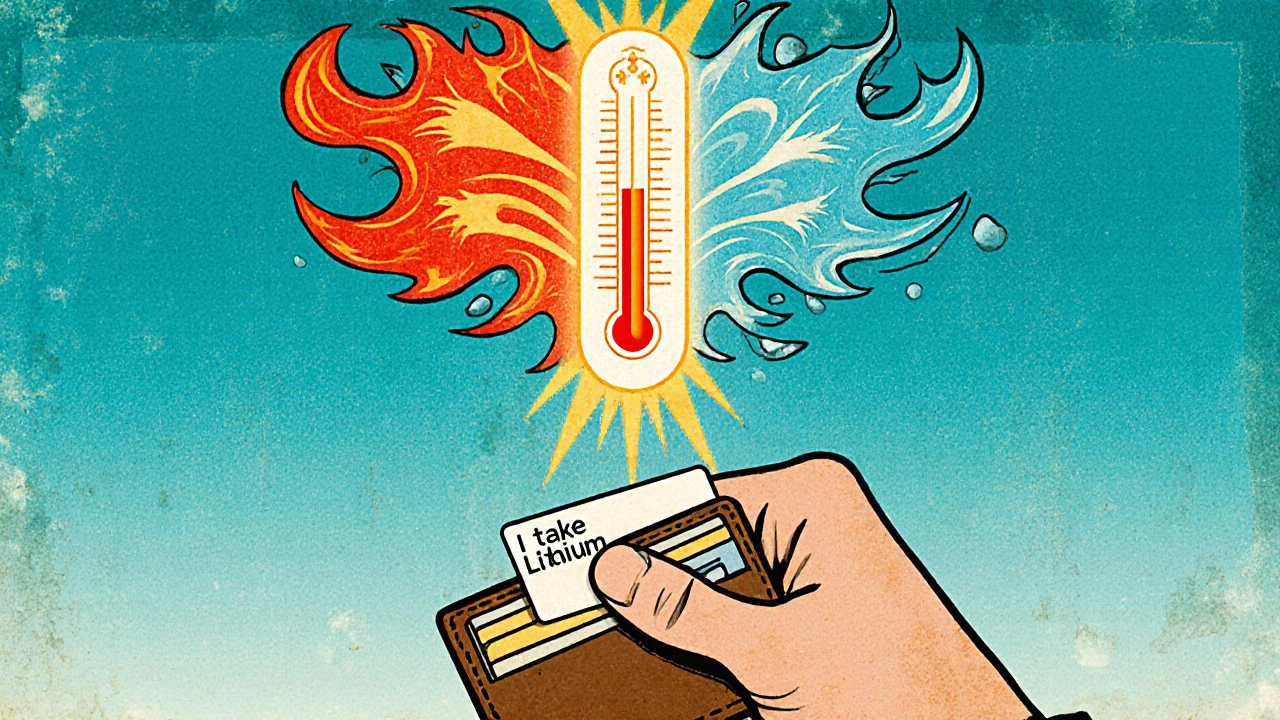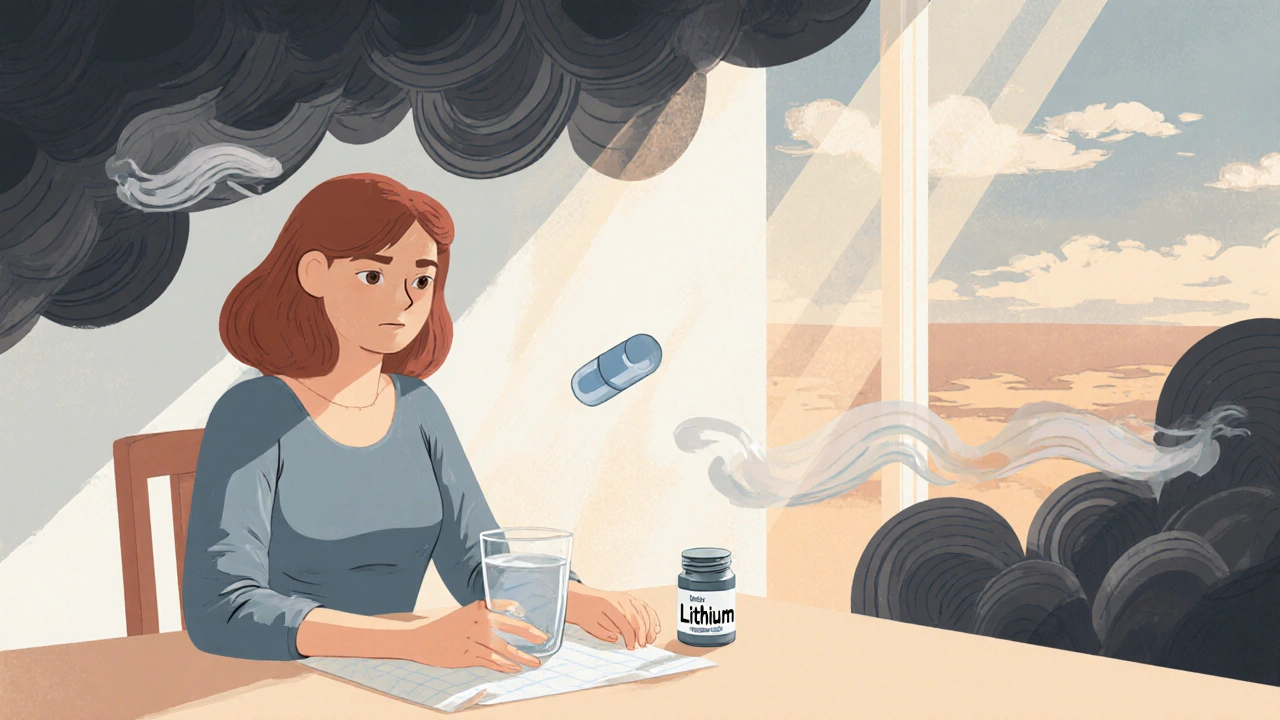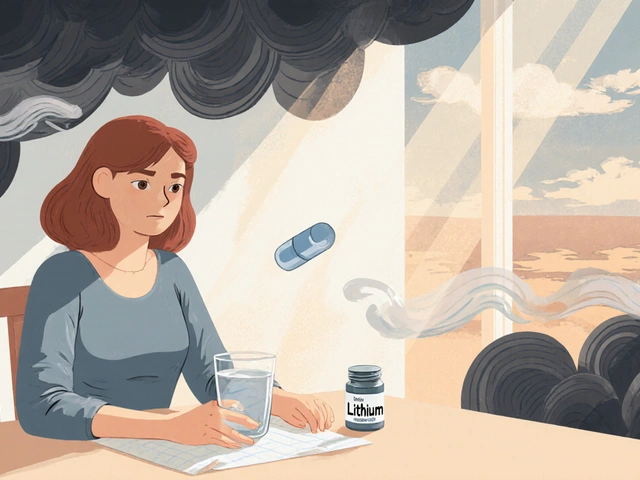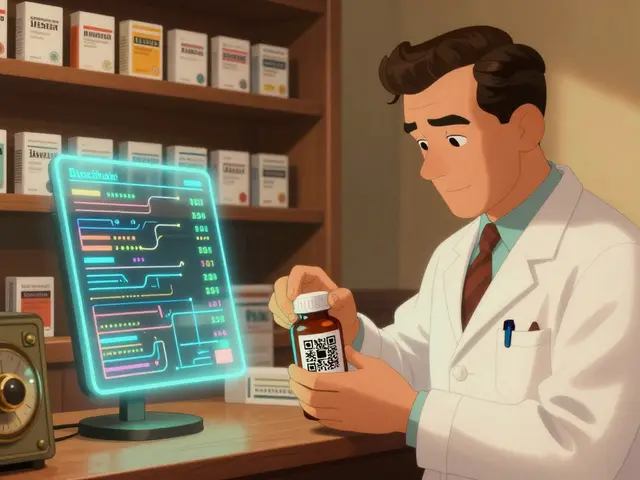Lithium isn’t just a metal you find in batteries. For millions of people around the world, it’s a lifeline. It’s one of the oldest and most effective treatments for bipolar disorder, helping people regain control over their moods, sleep, and daily lives. Unlike newer drugs that come and go in popularity, lithium has been used since the 1940s-and it still works better than most alternatives for many patients.
What is lithium, really?
Lithium is a naturally occurring alkali metal, found in small amounts in rocks, soil, and even drinking water. But when doctors prescribe it, they’re not giving you raw metal. They’re prescribing lithium carbonate or lithium citrate-stable, purified forms that your body can safely absorb. It’s not a sedative, not an antidepressant, and not a sleeping pill. It’s a mood stabilizer, meaning it helps smooth out the extreme highs and lows of bipolar disorder.
People with bipolar disorder experience episodes of mania-where they feel overly energetic, impulsive, or even paranoid-and depression, where they feel hopeless, tired, and disconnected. Lithium doesn’t just treat one side of this coin. It reduces the frequency and severity of both. Studies show it cuts the risk of suicide in people with bipolar disorder by up to 80%, a number unmatched by most other psychiatric medications.
How does lithium actually work?
No one knows exactly how lithium changes the brain, but scientists have strong clues. It affects how nerve cells communicate, especially in areas linked to emotion and decision-making. It boosts levels of a protein called BDNF, which helps brain cells grow and repair themselves. It also lowers the activity of a chemical called glutamate, which can become overactive during manic episodes.
Think of it like a thermostat for your mood. When your brain’s emotional system starts overheating during mania, lithium cools it down. When it’s freezing during depression, lithium gently warms it up. It doesn’t make you feel ‘normal’ in a flat way-it helps you feel more like yourself, without the roller coaster.
Who takes lithium, and why?
Lithium is primarily prescribed for bipolar I disorder, especially when someone has had clear manic episodes. It’s also used for bipolar II and sometimes for treatment-resistant depression when other drugs have failed. About 1 in 10 people with bipolar disorder in the UK take lithium. It’s not for everyone, but for those it helps, the difference is life-changing.
Some patients start lithium after a first manic episode. Others have tried antidepressants that made things worse-triggering mania or causing rapid cycling between moods. Lithium is often the next step. It’s not fast-acting. It can take weeks to build up in your system and start working. But once it does, many people say they finally feel stable for the first time in years.
What are the side effects?
Lithium isn’t magic. It comes with trade-offs. Common side effects include:
- Tremors in the hands
- Increased thirst and frequent urination
- Weight gain
- Thyroid problems (like hypothyroidism)
- Kidney changes over time
These aren’t always deal-breakers. Many people manage tremors with small doses of beta-blockers. Thirst and urination are annoying but manageable with water and timing. Weight gain is real, but not everyone experiences it-and it’s often less than with other mood stabilizers like valproate or olanzapine.
The biggest risk? Toxicity. Lithium has a narrow window between a helpful dose and a dangerous one. That’s why blood tests are non-negotiable. Doctors check your lithium levels every few months, especially when you start or change doses. Levels above 1.2 mmol/L can be toxic. Symptoms of toxicity include confusion, vomiting, muscle weakness, and dizziness. If you ever feel this way, stop taking lithium and get help immediately.

Why isn’t lithium used more often?
It’s not because it doesn’t work. It’s because it’s old, cheap, and hard to patent. Pharmaceutical companies make more money selling newer, pricier drugs-even if they’re less effective. Lithium costs less than £5 a month in the UK. Most doctors know it works. But many patients are never offered it. Instead, they’re pushed toward newer antipsychotics or antidepressants, which may not be the best fit.
There’s also a stigma. Some people think lithium means you’re ‘severely ill’ or ‘crazy.’ That’s nonsense. Lithium is used by teachers, nurses, engineers, and parents. It’s not a sign of weakness. It’s a tool. Just like insulin for diabetes, lithium helps balance something your body can’t regulate on its own.
What’s life like on lithium?
One patient in Manchester, Sarah, started lithium after three hospitalizations in two years. She’d lost her job, her relationships, and nearly her life. After six weeks, her tremors faded. Her sleep returned. She stopped yelling at her kids. She started painting again. She says, ‘It didn’t make me happy. But it gave me back the space to be happy.’
Another man, James, took lithium for 18 years. He had one manic episode in that time-after forgetting to get his blood tested. He learned the hard way: lithium only works if you stay consistent. He now carries a small card in his wallet that says: ‘I take lithium. My blood levels must be checked monthly.’
It’s not glamorous. It’s not flashy. But for people with bipolar disorder, lithium is often the difference between survival and crisis.
What to expect when starting lithium
If your doctor suggests lithium, here’s what usually happens:
- You get a baseline blood test: kidney function, thyroid levels, and a lithium level.
- You start with a low dose-often 300mg once or twice a day.
- After 5-7 days, you get your first follow-up blood test to check your lithium level.
- Dosage is adjusted every week or two until your level is in the sweet spot: 0.6-0.8 mmol/L for maintenance.
- Once stable, you get blood tests every 3 months, or more often if you’re sick, dehydrated, or changing medications.
You’ll need to drink plenty of water. Avoid low-salt diets-they can spike lithium levels. Don’t take NSAIDs like ibuprofen without checking with your doctor. They can interfere with kidney clearance and raise your risk of toxicity.

Alternatives to lithium
There are other mood stabilizers:
- Valproate: Works well for mania but can cause weight gain, hair loss, and is unsafe in pregnancy.
- Carbamazepine: Used less often now due to drug interactions and liver risks.
- Lamotrigine: Better for depression than mania. Often paired with lithium.
- Antipsychotics like quetiapine or aripiprazole: Used for acute episodes but less effective for long-term prevention.
None of these have lithium’s proven track record for preventing suicide. None are as effective at stopping both highs and lows. That’s why many specialists still call lithium the gold standard.
Can you stop lithium?
Some people want to stop because of side effects. Others feel fine and think they’re cured. But stopping lithium suddenly can trigger a rebound manic or depressive episode-even if you’ve been stable for years.
If you and your doctor decide to stop, it must be done slowly-over weeks or months. Never quit cold turkey. Your brain has adapted to lithium’s presence. Removing it too fast can cause instability worse than before you started.
Some people stay on lithium for life. Others taper off after years of stability. There’s no right answer. It depends on your history, your risks, and your goals.
Final thoughts
Lithium isn’t perfect. But it’s one of the few psychiatric treatments that doesn’t just mask symptoms-it changes the course of the illness. It saves lives. It restores relationships. It gives people back their future.
If you or someone you know has bipolar disorder and hasn’t been offered lithium, ask why. It’s not outdated. It’s underused. And for many, it’s still the best option on the table.
Is lithium addictive?
No, lithium is not addictive. It doesn’t create cravings, tolerance, or withdrawal symptoms like opioids or benzodiazepines. Stopping it suddenly can cause mood instability, but that’s because your brain has adjusted to its presence-not because you’re physically dependent.
Can you drink alcohol while taking lithium?
It’s best to avoid alcohol. Alcohol dehydrates you, which can raise lithium levels and increase the risk of toxicity. It also worsens depression and can interfere with sleep-both of which lithium is meant to help. If you choose to drink, do so rarely and in very small amounts, and always check your blood levels after.
Does lithium cause weight gain?
Yes, it can. About half of people on lithium gain some weight, usually 5-15 pounds. It’s not inevitable, though. Eating a balanced diet, staying active, and avoiding sugary drinks can help. Some people switch to lamotrigine if weight gain becomes a major issue, but lithium’s benefits often outweigh this side effect.
Can women take lithium during pregnancy?
Lithium carries a small risk of heart defects in the baby, especially in the first trimester. But untreated bipolar disorder during pregnancy carries higher risks-like preterm birth, postpartum psychosis, or suicide. Many women continue lithium under close monitoring, with extra ultrasounds and specialist care. Never stop lithium during pregnancy without talking to your doctor.
How long does it take for lithium to work?
It usually takes 1 to 3 weeks to start working, and up to 6 weeks to reach full effect. Some people feel calmer sooner. Others need longer. Blood tests help doctors adjust the dose. Patience is key-this isn’t a quick fix, but it’s a lasting one.
Can lithium help with depression that doesn’t respond to antidepressants?
Yes. Lithium is often added to antidepressants when they aren’t enough. This is called augmentation. Studies show it can improve response rates by up to 50% in treatment-resistant depression-even in people without bipolar disorder. It’s not first-line for unipolar depression, but it’s a powerful tool when others fail.
For those who’ve tried everything else, lithium remains one of the most reliable tools in psychiatry. It’s not new. It’s not trendy. But for the right person, it’s everything.








Write a comment
Your email address will be restricted to us